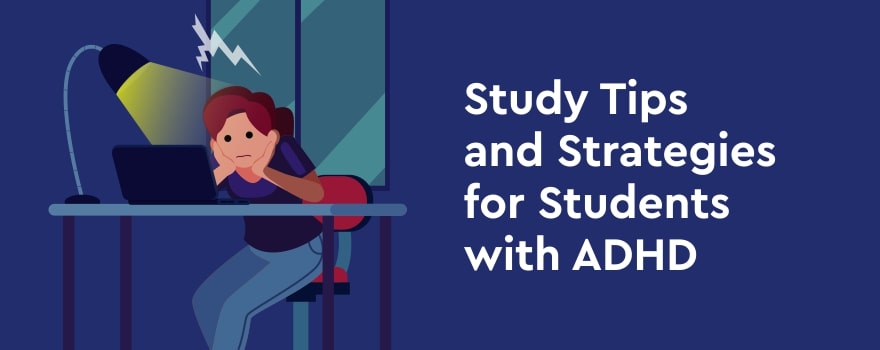If you’re a college student with ADHD, you should feel proud of your accomplishments. However, if you have ADHD, meeting your academic goals can be challenging.
Managing your ADHD and achieving academic success is a result of persistence and hard work. Thankfully, there are many tools and strategies to ensure a successful college experience.
Everything from time management and memory improvement to mindset changes and accessibility aids on campus can boost your study skills and help you meet your goals.
Mindset and confidence

Sometimes, the best way to succeed is to improve your confidence and mindset.
Negative thoughts are a constant struggle for many students, and confidence doesn’t come naturally for most people. Students with ADHD are often plagued by feelings of not measuring up to their peers and continuously compare themselves to others.
We’ll cover some great ways to change old belief patterns, allowing you to implement new support systems and tools to boost your morale and help you thrive in college.
Reject toxic productivity
Just “trying harder” isn’t the solution for those with ADHD. Most productivity messaging and tips are geared towards neurotypical people. Don’t fall into the trap of thinking that you’re failing at productivity just because you do it differently.
Try these productivity hacks instead:
- Make the task at hand a game or challenge. This can infuse fun into the mix and keep things interesting.
- Approach tasks with creativity. Find ways to spice it up!
- Use a Pomodoro timer to break tasks up and gain a sense of accomplishment, and use urgency to your advantage as you try to beat the timer.
- Micro-commitments can be an awesome productivity motivator, since you’re simply agreeing to do one little thing – like reading two pages right now.
- Change your environment. Sometimes being around people can be stimulating.
- Use a time-based goal: for example, “I’m going to do this one thing for 15 minutes and be done”.
- Don’t stress or judge yourself for changing productivity tools as needed. It’s easy to get bored, and you may need a change of scenery, especially if you have ADHD.
Academic success begins with proper support

To maximize success, students with ADHD should prioritize finding a strong support system early in their college experience.
Students can progress and find fulfillment in both classwork and social life by joining a campus support group or counseling service. Individual coaching support is also available at some universities.
Joining communities of like-minded students and others who understand the challenges of ADHD can allow you to study in groups. This can bring a sense of belonging that you may not have experienced in other educational settings.
Support for college students with ADHD
- Join a support group for students with ADHD.
- Many colleges, such as Cal Poly, have group therapy meetings specifically for those with ADHD.
- Collaborate with other students to form study groups.
- Visit your campus disability services office to request any accommodations you might need; these might include quiet test-taking rooms and extended time to take exams.
- Visit a cognitive behavioral therapist specializing in ADHD to improve executive function improvement and address roadblocks to take your academic success to the next level.
Hire an ADHD coach to set learning goals
Working with a coach who specializes in ADHD can revolutionize your college goal-setting and strategizing sessions.
Working with an ADHD coach provides a great way to plan your academic path, helping you optimize your strengths and set goals for the areas you need help in.
Your coach can help with organization and time management skills, as well as strategies for other personal or social struggles.
When choosing a coach, make sure they specialize in college students with ADHD. They will have the tools and knowledge necessary to ensure you can succeed.
Benefits of Exercise
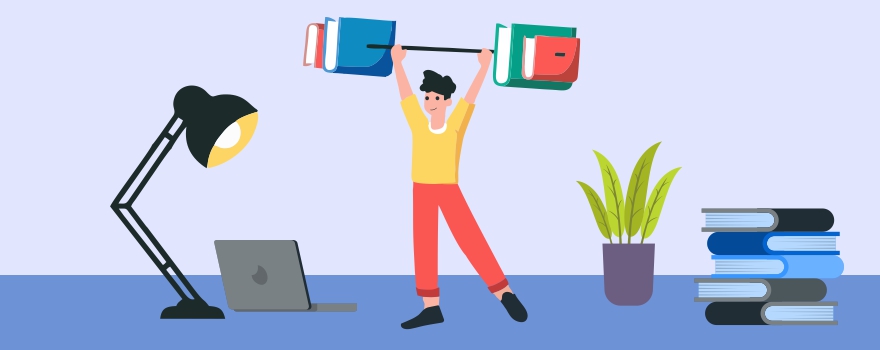
Exercise is the unsung hero for college students with ADHD. After all, regular movement can help you think more clearly.
"Even a single session of moving your body can make you more motivated for mental tasks, increase your brainpower, give you energy, and help you feel less confused. It acts on your brain in a lot of the same ways as your ADHD medication."
Cardiovascular exercise provides extra oxygen and releases dopamine in the brain, which stimulates concentration and cognitive functions. It’s also a great way to release pent-up stress and anxiety.
Even a small amount of exercise can be a great way for college students with ADHD to start the day. Exercise is useful at any time of the day. Use it when you need it!
Improve cognitive skills
The term “executive function skills” refers to the cognitive abilities involved in organizing thoughts and activities, prioritizing tasks, managing time effectively, and making decisions.
These skills play a large role in implementing solid study strategies and learning structures in college. Students with ADHD vary in their abilities to manage projects, complete assignments, and achieve goals. After all, each person is unique.
Whether you struggle with time management, organization, processing, or all of the above, there are plenty of tools and tricks to help you. By implementing these, you will see an improvement in your learning and study skills.
Some common challenges include:
- Struggles with time management and meeting deadlines
- Difficulty organizing tasks and materials
- Impaired ability to effectively prioritize tasks
- Challenges in planning and executing complex projects
- Difficulty maintaining attention and focus on tasks
- Forgetfulness and frequently misplacing items
- Trouble initiating tasks
- Procrastination
- Difficulty adapting to changes in routine or unexpected events
Time management tips
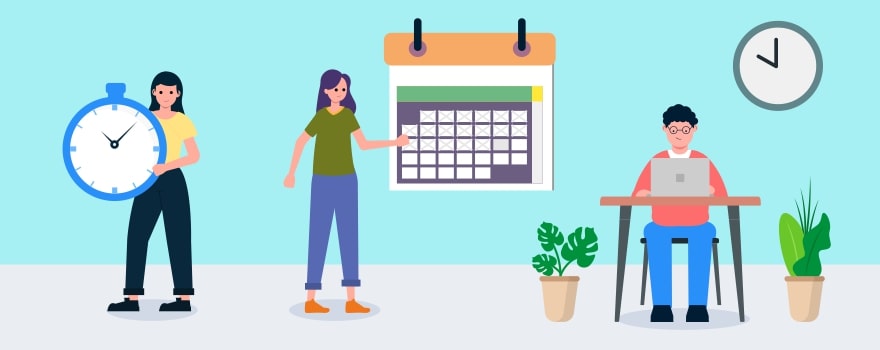
Managing studies, test preparation, classes, and regular life can be especially hard for those with ADHD. Organizing your time might sound challenging, but it can be done.
Remembering to show up for that study session or buy that textbook before classes start is entirely possible with these strategies and apps:
- Apps such as Due will remind you over and over again of an important task or appointment.
- Pomodoro timers help by splitting your day and tasks into small segments, allowing you to mark each one as complete. This provides regular doses of dopamine, which can provide a sense of accomplishment and motivation.
- Some time management tools include a variety of functions. Many contain calendar, to-do lists, task manager functions, and more within the software, and they are well worth checking out.
- One of the most complete task management tools is Tick Tick, which among dozens of other helpful tools, offers a Pomodoro timer and white noise.
- Visual cues – Good visual cues for time management can be very effective. Try color-coded calendars or planners to differentiate tasks or priorities.
Utilizing a whiteboard or chalkboard to visually map out daily or weekly schedules can provide a clear overview of upcoming activities.
Additionally, implementing visual timers or countdown clocks can help maintain focus and provide a tangible sense of time passing. Sticky notes strategically placed in prominent locations can also serve as reminders for important deadlines or tasks.
Organization strategies for optimized learning
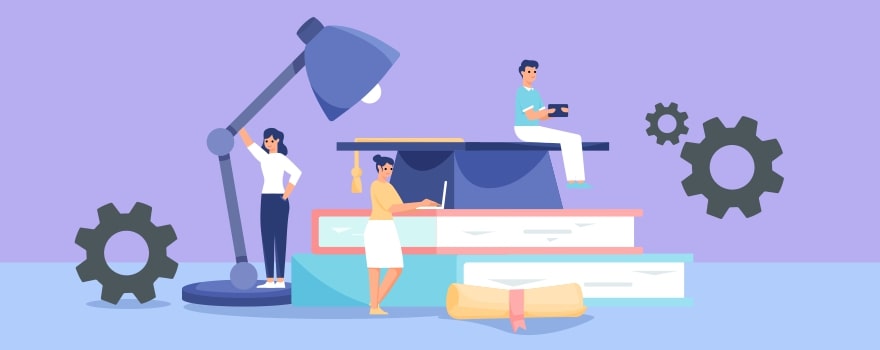
Even the best study strategies won’t work if you don’t stay organized. Adapting to new environments, like a new town, campus, or room can be disorienting for any student. For those with ADHD, it can be especially stressful.
Lacking organization skills isn’t just about losing things or being messy. Most of the time, students with ADHD grapple with disorganized thoughts, as well as physical organization challenges.
Keeping thoughts organized
The brain is like a supercomputer, so it’s no wonder we have a hard time controlling our thoughts and ideas. For those with ADHD, it can feel like you have 100 tabs open at once.
The following tips and tools can help college students with ADHD funnel their thoughts into manageable segments. Assigning an order to ideas and thinking habits will minimize distractions and maximize quality study time.
- Mind mapping is a visual brainstorming tool to organize ideas or thoughts that center around a particular topic. There are several great apps for this, including one that works well with your smartphone.
- Sticky notes (Post-Its) are great for visually-oriented students with ADHD. They provide a very tangible way to arrange thoughts and ideas, as well as reminders to complete tasks. There are many ingenious ways to use sticky notes to stay organized.
- Hand-held recorders are easy and great on-the-go. If you don’t have paper and pen, or your thoughts are moving too fast, just speak into the palm of your hand. You can use your smartphone or a separate recorder.
- Notebooks and planners come in a huge variety of digital and physical formats. These are great for writing thoughts and reminders, but you might need to try a few to see what works best for you.
Physical organization tips
Bringing order to your physical surroundings will help study time become more manageable and enjoyable. Losing things is one of the most frustrating struggles for those with ADHD. Organizing your spaces to work for you is key.
Whether it’s textbooks, loose papers, calculators, or other important objects, a centralized storage location can make a huge difference.
Using physical organizational tools creates visual reminders for where objects and study materials need to be. The following solutions can be easy ways to prevent organizational chaos.
Wire organizers: These can be wire racks or files that hang on the wall or a rack with wheels to keep near your desk or study space.
Basket: For a simple way to store keys, glasses, and other everyday objects, place a basket or bowl near your door. This way, you’ll know where to find everything before you need to leave.
Binder: Many students use binders to keep papers and assignments in one place. There are many different types of binders and ways to use them.
Organizing physical workspaces with clear bins or folders labeled with specific tasks or projects can also help reduce visual clutter and facilitate better organization and time management for those with ADHD.
Prioritizing tasks
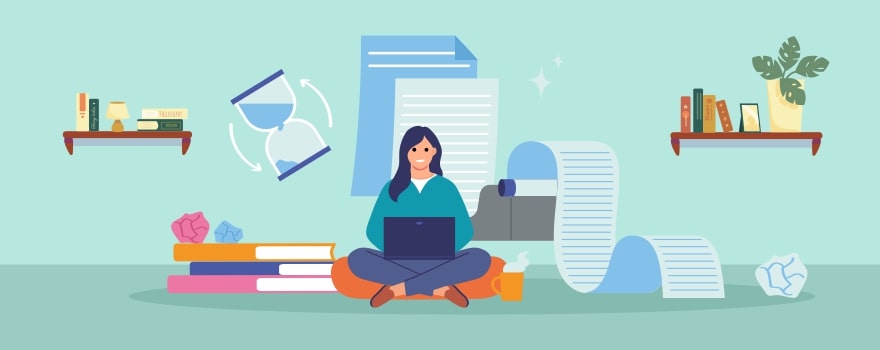
Truly effective study skills depend on prioritizing tasks. It’s about assigning importance to certain things, while allowing other tasks to wait their turn. This is the art of prioritizing.
Students with ADHD may struggle to discern which tasks or assignments are most crucial and require immediate attention. This challenge can lead to spending excessive amounts of time on less significant tasks while neglecting more critical or time-sensitive ones.
As students with ADHD learn to identify and prioritize tasks based on importance and urgency, they can allocate their time and energy more effectively, ensuring that essential assignments are completed on time.
Create a prioritization system
- Use the The Eisenhower Matrix, which teaches how to assign priority to projects depending on urgency and importance.
- Use color-coding or highlighting to emphasize critical assignments.
- Set reminders using alarms and digital tools to ensure prompt task completion.
Task management
Effective task management helps students break down overwhelming jobs into manageable steps in order to complete their assignments with confidence.
Task management aids can help students with ADHD manage their to-do list and deadlines in a visual way, which can greatly minimize procrastination.
The following apps are especially useful, since they offer a wide range of customization options and visual appeal.
Notion task management offers several choices for staying organized and on task, including a flexible online planner that’s customizable.
“The strength of Notion Planner is its ability to break down tasks and schedules into manageable and visually appealing formats. It provides various templates and frameworks that facilitate prioritization, goal-setting, and time management. Users can create to-do lists, set reminders, and establish routines to stay on track and meet deadlines effectively.”
When you get bored with the look of your system, just build a new dashboard with different images and colors to keep it new and exciting.
Omnifocus is an in-depth task management tool with many ways to manage daily academic tasks. Organize your important activities in this powerful system, which seamlessly integrates with Apple products.
Be aware that Omnifocus can be overwhelming and time-consuming to use. Make sure you are spending time on what you need to get done.
Classroom learning strategies
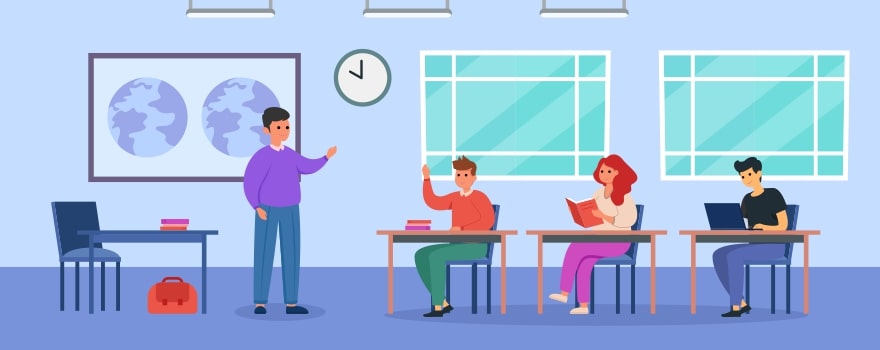
For students with ADHD, success in the classroom requires a different strategy. Unlike for other students, note taking, completing exams, and the need to move create unique challenges for those with ADHD.
Establishing a solid plan with the disabilities office ahead of time can transform lectures from an overwhelming event into a place of learning and growth. There is help for students with ADHD who struggle with taking notes, testing, and more.
Whether it’s through school resources or outside help, or a mixture of both, students with ADHD can develop effective learning strategies for the classroom.
Notetaking
- If you’re an auditory learner, check with the campus accessibility office to ask if someone can accompany you to class and take notes during the lecture.
- Put the date on top of all pages to track what date you covered the material.
- Try taking notes by hand during class if you learn best by writing. This minimizes laptop distractions and helps you better assimilate information.
- Leave a 3-inch margin on the left side of your paper and write notes on the rest. Use the empty space later to write questions or summaries for extra review.
- Don’t try to write everything the professor says; instead, practice jotting down only important points, especially when preceded with “this will be on the test”.
- If the professor seems to be speaking too fast, try writing key words you hear that will jog your memory so you can fill in details later.
- Leave extra space in your daily notes or the back of your notebook for things you might have missed but want to revisit.
- You can also use extra space in your notes for drawing or doodling, which may improve your focus as you listen.
- If you prefer typing notes, transfer your written notes to your laptop while studying. You'll retain the information better by reviewing it a second time.
- Use various colors of pens and highlighters or sticky tabs to organize important topics.
- Apps such as Evernote, OneNote, and Obsidian can be very helpful as digital tools for notetaking or transferring handwritten notes to your laptop.
Test taking
- If you need extra time to take tests, check with the accessibility/disability services office on campus to request additional time.
- Additionally, ask for a quiet space to take your tests if auditory or visual distractions are a problem for you.
- The day before your test, practice with quizzes if possible. Try this quiz app for fun.
- For multiple choice tests, read the question slowly to be sure you understand and then go with your gut when you’re not sure. Your first guess is usually right.
- Put a star or mark near any difficult questions you don’t have answers for and complete the questions you are sure about. Come back to the harder ones later to think through them more thoroughly.
- If you’re an auditory learner, you may be allowed to take an oral exam instead. Check with the accessibility office or your professor.
- For essay exams, complete the easiest questions first and then take extra time for the difficult parts. Use the sandwich method: intro point, three key points, and conclusion.
Movement needs
- Bring a squeeze ball to class to incorporate some quiet movement without distracting others.
- Spin rings are also great during lectures.
- Leave space on your notebook paper for drawing, or keep a dedicated doodle pad on your desk while listening to your professor.
- Depending on the setup of the classroom, request an exercise ball so your body can move. This might work well during small group study sessions.
- Chewing gum can help some students with ADHD concentrate better.
- Small items, such as silly putty, beaded bracelets, or puzzle cubes can help keep your hands occupied during long lecture sessions.
- Stand or stretch regularly if you can. Sometimes, sitting near the back of the lecture hall can make this easier.
- Exercising before class, as well as walking or biking briskly on the way to class, is an excellent way to release excess energy.
Information retention and processing while studying

Students with ADHD often find it difficult to process and memorize study materials effectively before the test. Here are some tips and study strategies to retain the information you study.
Preparing for tests
Test preparation presents its own set of challenges if your brain can’t slow down or focus on memorizing and retaining concepts. For students with ADHD, flashcard apps could be a lifesaver.
Flashcard apps for ADHD
- Cram - You can add photos or text to your study cards, which include a hint section as well. Use either Memorization or Cram mode. Memorization mode allows you to advance through the cards at your own pace, while Cram mode won’t let you continue until you give the right answer.
- Quizlet - Create your study set with the necessary facts to include text, audio, and visuals that will keep you engaged. This program is available on their website or app. There are various modes, including partial credit for answers.
- StudyStack - If you love games, you’ll thrive with this app that helps you learn important material. It’s fun and easy to create flashcards, crosswords, matching games, and more.
- Adobe Spark - This app is perfect for visual learners who enjoy colors. You can select a theme and add the information to your cards, which makes study time much more visually appealing.
Tips for retaining information
- Utilize active recall as much as possible. Talk about what you’re studying, read notes out loud, or make games with quizzing apps.
- The Feynman technique is a way to review information you want to retain by learning it yourself and then teaching it to someone else. The act of showing or teaching another person solidifies the information in your brain.
- Summarize material as you’re reading through notes or your textbook, and take frequent breaks to write a small synopsis of each important section. You can use colored sticky notes to draw attention to parts needing the most review.
- Highlighters in different colors can emphasize facts and topics you’d like to focus on.
- Colored sticky notes can serve as small notepads to summarize text or notes you’re studying. Classify the topics by color for even more organization.
- Mnemonics can be very helpful for memorizing tricky information. This is a strategy that uses rhymes, phrases, acronyms, and songs for effective memorization.
- Speech to text apps can be powerful tools for studying and information retention. Many students with ADHD do better by hearing the information out loud. Apps like Speechify even work with iPhones, so students can listen and digest information while on the go.
- Mind Mapping is a great way to actively review important study material in a very hands-on and visual way. By breaking down important topics into smaller subtopics, you can strengthen your memory recall. You can draw a mind map on paper with brightly colored pens or create one with apps like Coggle and Ayoa.
Conclusion
Improving study techniques and learning strategies for college students with ADHD requires a multifaceted approach that uses the best tools and aids available.
Leveraging notetaking and study apps, along with improving your mindset and physical health, can greatly help college students with ADHD meet their academic goals.
Moreover, honing organizational and time management skills gives students the freedom to learn without the stress of disorganization.
By integrating unique strategies and accessibility aids into a regular academic routine, college students with ADHD can unlock their full potential and thrive in higher education.
Additional resources
For colleges with strong programs for ADHD and other learning differences.
https://chadd.org/for-parents/finding-the-right-college/
https://www.collegetransitions.com/dataverse/learning-support-services
Check out this college survival guide for students with ADHD.
Suggested reading: Atomic Habits by James Clear and ADHD 2.0:New Science and Essential Strategies for Thriving with Distraction--from Childhood through Adulthood by Dr. Edward M. Hallowell and Dr. John J. Ratey.


